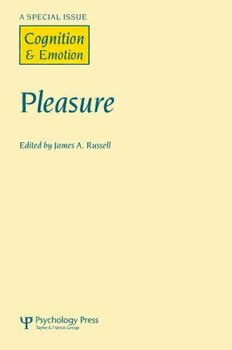
Pleasure PDF
202 Pages·2003·1.87 MB·English
Most books are stored in the elastic cloud where traffic is expensive. For this reason, we have a limit on daily download.
Preview Pleasure
Description:
Like 'mind' and 'consciousness', 'pleasure' was all but tabooed in psychology for much of the 20th Century. Like those concepts too, pleasure is difficult to define or to assess scientifically. Still, evidence has steadily accumulated that pleasure is involved in all aspects of psychology. The simplest sensory experience is tinged with pleasure or displeasure. Some (although not all) planning for the future involves maximizing pleasure. Pleasantness is the first factor of mood, which is known to influence various cognitive processes. In some theories, pleasure or displeasure lie at the heart of emotion. Articles in this Special Issue take up such issues as these as well as the neurophysiological substrate of pleasure, its role in planned behaviour, nonconscious pleasure, the lay concept of pleasure, and whether smiles and laughter are signs of pleasure.
See more
The list of books you might like
Most books are stored in the elastic cloud where traffic is expensive. For this reason, we have a limit on daily download.
